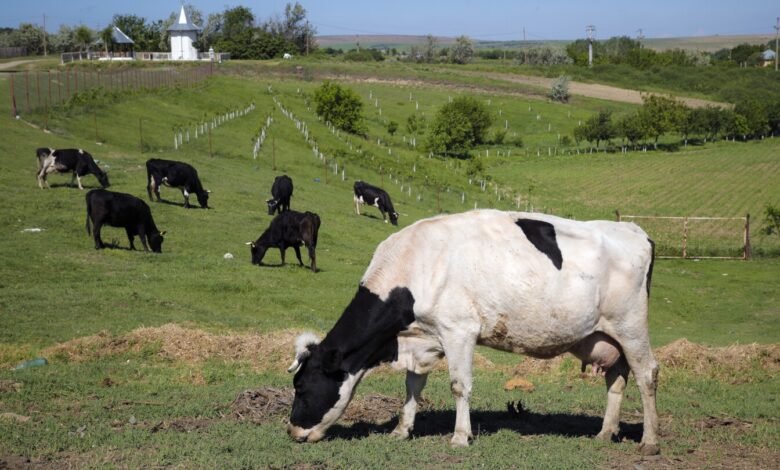Gassy cows and pigs will face carbon tax in Denmark, a world first

COPENHAGEN, Denmark (AP) — Denmark will tax livestock farmers for the greenhouse gases emitted by their cows, sheep and pigs starting in 2030, the first country in the world to do so as it targets an important source of methane emissions, one of the most potent gases contributing to global warming.
The aim is to reduce Danish greenhouse gas emissions by 70% compared to 1990 levels by 2030, said Tax Minister Jeppe Bruus.
From 2030, Danish livestock farmers will be taxed 300 kroner ($43) per ton of carbon dioxide equivalent in 2030. The tax will increase to 750 kroner ($108) in 2035. However, due to a deduction from income tax of 60%, the real cost per ton will start at 120 kroner ($17.3) and increase to 300 kroner by 2035.
While carbon dioxide typically gets more attention for its role in climate change, methane traps about 87 times more heat over a 20-year timescale, according to the U.S. National Oceanic and Atmospheric Administration.
methane levelswhich is emitted by sources including landfills, oil and natural gas systems, and livestock farming, has increased particularly rapidly since 2020. Livestock account responsible for about 32% of human-caused methane emissions, says the United Nations Environment Program.
“We will take a big step towards climate neutrality in 2045,” said Bruus, adding that Denmark “will be the first country in the world to introduce a true CO2 tax on agriculture” and hopes other countries will follow suit.
New Zealand passed a similar law that was due to come into force in 2025. However, the legislation was removed from statute on Wednesday following strong criticism from farmers and a change of government in the 2023 election from a centrist ruling bloc. -left to a center. -the right. New Zealand said it would exclude agriculture from its emissions trading scheme in favor of exploring other ways to reduce methane.
In Denmark, the agreement was reached on Monday night between the center-right government and representatives of farmers, industry, unions, among others, and presented on Tuesday.
Denmark’s decision comes after months of protests by farmers across Europe against climate change mitigation measures and regulations that they say are driving them out of business.
The Danish Society for Nature Conservation, the largest environmental and nature conservation organization in Denmark, described the tax agreement as “a historic commitment”.
“We managed to reach an agreement on a CO2 tax, which lays the foundations for a restructured food industry – also on the other side of 2030”, said its boss, Maria Reumert Gjerding, after the talks in which they participated.
A typical Danish cow produces 6 metric tons (6.6 tons) of CO2 equivalent per year. Denmark, which is a major exporter of dairy products and pork, will also tax pigs, even though cows produce much higher emissions than pigs.
The tax must be approved in the 179-seat Folketing, or parliament, but the bill is expected to be approved after broad consensus.
According to Statistics Denmark, as of June 30, 2022, there were 1,484,377 cows in the Scandinavian country, a slight decrease compared to the previous year.
___
Read more about AP’s climate coverage at http://www.apnews.com/climate-and-environment
___
Associated Press writer Charlotte Graham-McLay in Wellington, New Zealand, contributed to this report.



